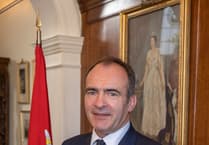A government minister has acknowledged that replacing the island’s bus fleet with electric vehicles wouldn’t be a simple task.
A two-week electric bus trial to assess its suitability for the island is currently taking place, as Isle of Man Today reported earlier this week.
Infrastructure Minister Chris Thomas said: ‘An electric bus route for the island would consume a huge amount of electricity so we would need bigger wires, more capacity and the like.
‘We would have to completely reconfigure the way that we supply electricity to where those buses are working.
‘When you have an electric car, you double the amount of electricity used in that house.
‘So when you have a fleet of 70 buses, it is a huge amount of electricity, and that’s why some people say that electricity may not completely be the future for heavy vehicles like ships and lorries and the like.
‘So we need to look at alternative technologies as well as electricity.’
The test vehicle is a eCitaro Demonstrator owned by Mercedes and is already being used in some areas in the UK.
The trial is for Isle of Man Transport to explore the various technologies available.
Mr Thomas said: ‘We have got an excellent bus service, and reviewing the technology is an important part of that bus service.’
The bus has not been carrying passenger but the trial has seen drivers and Bus Vannin management gathering information around logistics such as battery life, and practicalities around the terrain, using sandbags to simulate passengers.
‘There is telematics [a field combining telecommunications, vehicular technologies, electrical engineering and computer science] in the bus recording how it works on the TT course and on our other roads as it is going round the island, I think it has been to the workshop as well, so the trial is for us and our manufacturers,’ said Mr Thomas.
Richard Cranmer, project manager for Isle of Man Transport, said: ‘These buses are operating successfully all over the country, and they are operating much better in city environments than in interurban environments, which is very much what we have here.
‘So that is something that will test us most.’
Mr Thomas added: ‘But when you are going over the mountain you don’t want the bus to run out of battery.’
Mr Cranmer said: ‘We do have a very fast network over here of interurban services. Electric buses are not necessarily the best for that at the moment, so that is what we are trying to test.’
Other logistics to consider are the island’s electricity infrastructure.
Mr Cranmer said that through the trial the bus has been taking 16 hours to charge, as we do not currently have the infrastructure to facilitate faster charging.
He said: ‘If and when we do order the buses, we would have to prepare our garage facilities accordingly.’
The manufacturer says that the battery life should last eight years.
Mr Thomas says he hopes that the bus will return later this year for a trial with passengers in service.




